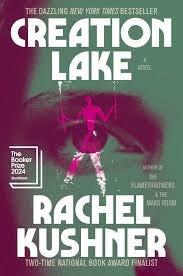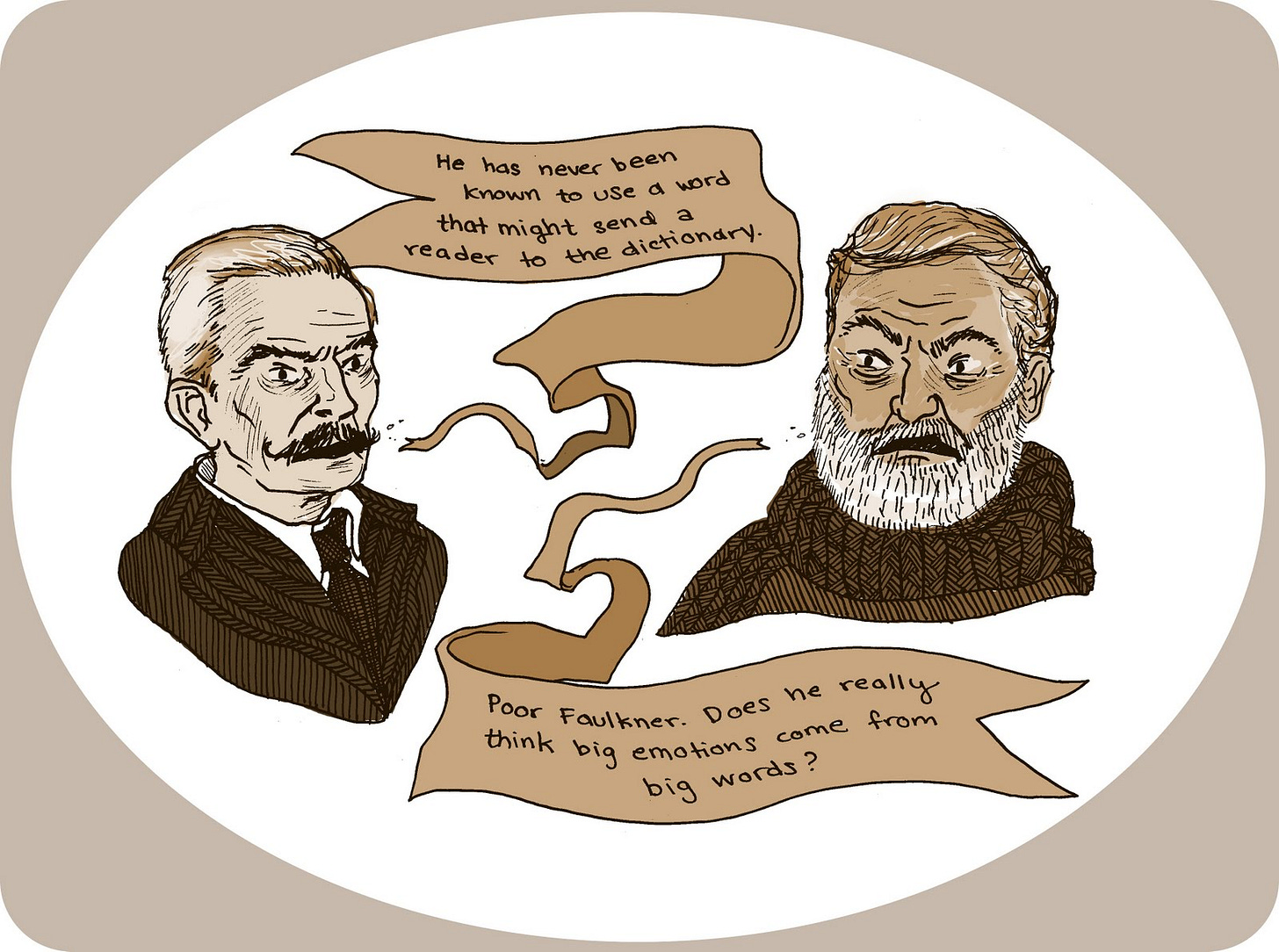Sometimes before I write these reviews, I’ll look up a few other reviews of the book by proper reviewers, just to see what the consensus is and if there’s maybe some angle I’ve missed. That’s what I did for Creation Lake by Rachel Kushner, because it is a very unique and interesting book. One review stuck out to me. Maureen Corrigan, writing for NPR, said:
You don’t read Kushner for the “relatability” of her characters or even, particularly, for what happens in her novels.
Here’s the funny bit - that’s from a rave review. Clearly, Maureen and I are reading for different reasons. Let me tell you why.
Spoiler Free Summary
“Sadie Smith”, a pseudonym, is a spy-for-hire who has been contracted to infiltrate and sabotage a group of French environmental activists. She does so, but as she learns more about the group, she starts to question her own place in the world they are trying to change.
Buttons!
I have so many buttons for you. Here’s one to subscribe to The Plot Sickens:
And here’s one to share it with other people:
And here’s one to get these books for yourself:
And here’s one to support the site:
And here’s one for your shirt:
The Good
Rachel Kushner has a unique voice. Right from the start, you can tell that this book isn’t going to sound much like other books on the shelf. I’m having a hard time thinking how to describe it. Kushner’s prose has this clipped and punchy vibe, but at the same time, it feels…sultry? It’s kind of how you’d expect someone smoking a hand-rolled cigarette in the darkest corner of a jazz club to talk. Kushner is very selective and deliberate on where and how she dispenses details. At one moment she’ll take pages to describe a character doing some mundane task, then just as easily skip an entire conversation between two main characters by summarizing the whole thing in a single sentence. I don’t mean to make her sound sloppy, which she most certainly is not. It’s just a very different style from most writing I’ve encountered before. It was refreshing, in an odd way.
Creation Lake is also very funny at times, and occasionally the humor veers into a self-referential meta style. I don’t think this is giving too much away as it has no bearing on the plot, but if you really want to avoid spoilers, move on to the next paragraph as I’m about to describe one such joke. Ready? Here we go. Early on, Sadie notices the Daft Punk song “Get Lucky” playing nearby. A little while later, a car goes by blasting the same tune. It shows up with increasing frequency, until eventually you turn a page to find the next chapter is entitled “Get Lucky”. Commendably, the references stop there, as Kushner knows the joke has peaked, and lets it rest. I think a more novice author would keep mentioning it past this point, until it got stale. Kushner seems confident enough to let the joke land, and leave it be.
Ok, spoiler over. Now I’m going to praise Kushner for something that I’m immediately going to turn around and bash her for, but if you can’t be a hypocrite on your own Substack, then where can you be one? There is a lot of philosophy in here (more on that in a moment), and Kushner writes it in an impactful, accessible, and intelligent way. I don’t think everything in Creation Lake will resonate with you, but I think you’ll find something that sticks.
The Bad
I didn’t count paragraph by paragraph, but I’d guess that only 30% of Creation Lake is about the plot of the book. “How can that be?”, you ask. Thank you for asking, I’ll tell you.
The remaining 70% is comprised of long musings on the nature of humanity. The majority of these essays, for lack of a better term, come in the form of transcribed emails to Le Moulin (the environmental activist group) from Bruno (a kind of guru to them). As part of her research into the group, Sadie gains access to Bruno’s email and reads these missives closely, both to better understand Le Moulin’s thinking as well as try and tease out their possible future plans. Then, Le Moulin’s leader Pascal also espouses his own views, Sadie dishes out some of her own, and a few random characters along the way chime in too. These meditations focus on freedom and introspection, about the balance between rejecting an amoral society while acknowledging your need of the same. Or something like that. Bruno talks a lot about Neanderthals and how they’ve been unfairly maligned by historians.
Here’s the thing. If you were interested in that kind of thing, you could find books on philosophy or history that would be much more instructive. If you’re looking for a good story and characters, with Creation Lake you have to wade through all of this deep thinking to get to it. So, who is this novel for? I have a section on that below, with a new format even (!), but for now…it’s a very narrow cross-section of readers, I think.
Maybe I just didn’t “get” it. That’s entirely possible. I could be too thick to appreciate the ideas presented, but I don’t think so. I’m not trying to toot my own horn, but I get the feeling this is more of an Emperor’s New Clothes situation. I’m sure there are those out there who really dig into the philosophy stuff and enjoy it, but I think there are more that want to like it because it’s the kind of thing that they think they should like.1 A symptom of speeding towards 40 is that with each passing day, I care less and less about that, and am more interested in what I authentically, truly find resonant.2 This ain’t it.
To mirror the opening of this review, here’s Dwight Garner in the New York Times:
Sinuous and powerfully understated... Consolidates Kushner’s status as one of finest novelists working in the English language. You know from this book’s opening paragraphs that you are in the hands of a major writer, one who processes experience on a deep level. Kushner has a gift for almost effortless intellectual penetration... Pointed comic observation in this novel blends with her earnestness in vinaigrette harmony.
I’m more of a “Caesar melody” guy than a “vinaigrette harmony” guy myself. Look, if you read that blurb from Garner and thought “effortless intellectual penetration, my favorite!”, this book is for you. I’d rather be differently penetrated. Wait…
Memorable Quotes
Charisma does not originate inside the person called “charismatic”. It comes from the need of others to believe that special people exist.
Not sure I agree, but I never thought about it that way.
People might claim to believe in this or that, but in the four a.m. version of themselves, most possess no fixed idea on how society should be organized. When people face themselves, alone, the passions they have been busy performind all day, and that they rely on to reassure themselvest hat they are who they claim to be, to reassure their milieu of the same, those things fall away.
What is it people encounter in their stark and solitary four a.m. self? What is inside them?
Not politics. There are no politics inside of people.
The truth of a person, under all the layers and guises, the significations of group and type, the quiet truth, underneath the noise of opinions and “beliefs,” is a substance that is pure and stubborn and consistent. It is a hard, white salt.
This salt is the core. The four a.m. reality of being.
Believe it or not, this is not taken from one of Bruno’s emails. This is just Sadie talking.
I said nothing, a generally effective method for getting people to continue to speak.
Ha.
“God’s way of remaining anonymous,” Pascal might say of the phenomenon of coincidence…But, Pascal, a coincidence is not God’s way of remaining anonymous. “Coincidence” is a term you choose for the good work it does to cover what some part of you knows, but a part that cannot be allowed to speak.
The coincidence, as an explanation for things that are mysteriously aligned, is hiding what is not a coincidence, Pascal, and is instead a plot.
Again, not one of Bruno’s emails. Just talk. It makes me sleepy.
Final Thoughts
In addition to quotes, I collect words I had to look up while reading. Creation Lake had more than most3:
Coterminous
Sacristy
Dehiscing
Disquisition
They’re fine words, they fit the context perfectly, good diction all around. But it reminds me of this exchange between Faulkner and Hemingway:
I feel that this applies to Creation Lake as a whole. It’s all fine, it’s all well-written and deeply-thought. It just…missed me. It tries to be a philosophical treatise and a noir spy novel, and doesn’t quite achieve either.
5 Star/1 Star
Darryl Suite gives 5 stars on Goodreads:
Well, well, well. After previously disliking everything this author has ever written, and writing her off as “not for me”, I was shocked by how much I actually loved this. It rocked.
Doesn’t sound like you really wrote her off, did you Darryl?
Lungstrum Smalls4 gives 1 star on Goodreads:
It must be said: this is a stupid book full of bad ideas, undercooked characters, and silly sentences.
Must it?
Who Should Read This?
Rating
Based on the above, you might think I’d be giving this 1 star. I’m not - like I said, Kushner is a singular voice and has a lot of interesting ideas. It just didn’t do it for me. So, Creation Lake, you have been awarded 2/5 Spy (vs. Spy):
It has occurred to me that this might be one of the conclusions of the philosophy presented in the book, which…fair play, Rachel Kushner
Which, again, is similar to some of Bruno’s points so…maybe I’m playing myself here.
If you’re curious, I’ll save you a trip to Google:
Coterminous - adj. sharing a common boundary; coextensive
Sacristy - A room in a church where sacred vessels and vestments are kept
Dehiscing - From botany, meaning to split open at maturity to release seeds
Disquisition - A thorough investigation or discussion of a topic
Phenomenal name.









Beautifuliy written by you. Doesn’t sound like a book I’d like. Love the button humor!